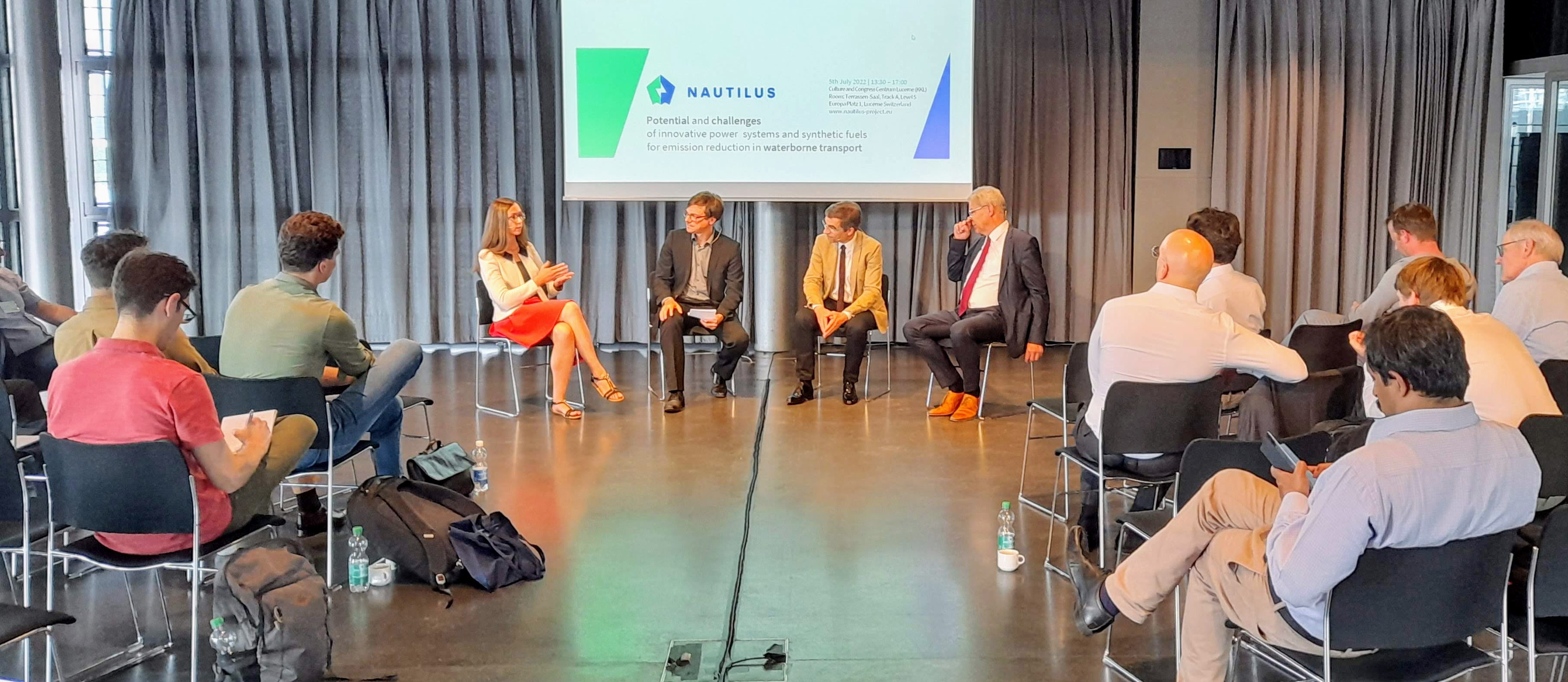NAUTILUS workshop was organised as a special event to the EFCF conference (5th EUROPEAN SOFC & SOE FORUM 2022) in Lucerne on 5th July 2022 that took place at the Culture and Congress Centrum Lucerne (KKL) situated on the shore of the Lucerne Lake.
The aim of this workshop was not only to present technology solution developed under the NAUTILUS project, but also to outline technology solutions and policy approaches to reduce the carbon di-oxide and other pollutants in waterborne transport. The event was opened by the coordinator of the NAUTILUS project, Dr. Asif Ansar, who briefly presented all speakers. The event was held in hybrid format, part of speakers and majority of participants was attending the event online, the other part onsite in Lucerne.
The first speaker, Dr. Anna Karamigkou, CINEA project officer, presented EU’s initiatives and key projects in the field of decarbonisation of waterborne transport. She started her presentation with contemporary programmes that are available to finance the transition to the decarbonised transport and continued with other mechanisms addressing other challenges that maritime transport is facing.
This presentation was followed by one of Ms. Delphine Gozillon from Transport & Environment, who gave an overview of policies and mechanisms for emission reduction and outlined further steps-to-be taken to reach this goal. She underlined the need of support of green electricity and e-H2-based fuels, disclosed, that according to the World Bank report, LNG alone will not probably play significant role in decarbonising maritime transport in the long term. Then she delineated measures to be taken on the EU level to promote green shipping such as EU-ETS for shipping and usage of the ETS revenues to finance early movers or recent FuelEU Maritime regulation.
First part of the workshop was completed by presentation of Dr. Asif Ansar, Head of Department ESI at German Aerospace Centre (DLR) who presented the technology approach examined by the NAUTILUS project and current state-of-work. He had explained the overall rationale behind the NAUTILUS project – increasing trend in emission produced by shipping having impact on human health and changing perception of shipping by the public. Then he explained phases of transition in shipping to zero emission, the first one is embedded in the change of the fuel from HFO to LNG and usage of scrubbers for the exhaust treatment. NAUTILUS represents the second stage of the transition by integration of high-power fuel cells combined with ICE generators, while LNG is used as a fuel for both systems. Genset developed by NAUTILUS is coupled with battery and this technology will lead to improved efficiency (10 percent increase), 40% CO2 reduction and zero methane slip. Then he explained the modular design of the NAUTILUS genset, current state of the power system modelling and introduced the experimental proof-of-concept located at DLR premises. Presentation was concluded by the vision of the third phase of transition realised by 100% replacement of ICE by fuel cells, which will be propelled by bio-methane and e-methane instead of LNG. Eventually only non-fossil-based methane that will lead to the goal of zero emission.
After the break the floor was given to Mr. Laurent Rouxel-Duval, R&D vice president at Chantiers de l’Atlantique, a European shipyard pioneer in energy and environment ship efficiencies, who revealed that only holistic approach can lead to problem solving. He had outlined main technology challenges to be solved – to find highly reliable, compact and affordable solution that is tailored for use in maritime application, reliable during the lifetime of the ship (30-40 years) and offering 24/7 operation with secured autonomy for 2-3 weeks. Due to volume storage constraint, liquid hydrogen is not a preferred option, while methane, methanol and given security constraint, ammonia, are primary choices. These challenges need new approach to find appropriate fuel/energy converter mix, define new 0-emission ship architecture accommodating these new systems while improving substantially the ship energy efficiency. He underlined the need of specific approach to each type of vessel as there is no global solution in terms of fuel and technology used that matches with all types of maritime transport.
The approach of one of the leading shipyards specialized on cruise ships Meyer Werft, to the challenge of constructing zero emission cruise ships was the topic presented by Mr. Hermann-Josef Mammes, head of R&D department at Meyer Werft. In his presentation, he underlined that it is hard to estimate which of alternative fuels will be the best solution for maritime transport in term of availability, safety and energy density. Then he mentioned that the currently the development of commercially useable fuel cell system for maritime applications is in progress but there is still a lot of R&D needed to prepare solutions for the different fuel options that are currently in consideration. Also, the development of rules and codes for the fuel options and fuel cell systems must be forced and supported without favouring a dedicated fuel or fuel cell technology.
The event was concluded by the discussion panel moderated by Matthias Metten (DLR) and Sabine Riek (DLR) between Delphine Gozillon, Laurent Rouxel Duval and Hermann Josef Mammes.
Presentations
- Anna Karamigkou - presentation
- Delphine Gozillon - presentation
- Asif Ansar - presentation
- Herman-Josef Mammes - presentation
Video taken at the event
This project has received funding from the European Union’s Horizon 2020 research and innovation program under grant agreement No 861647.
Stay in touch with us!
#NAUTILUS_2020 #propulsionsystem #sustainableshipping #battery #fuelcell #cruiseships
***
⇒ Follow us on Twitter/LinkedIn to be on board.
Follow #NAUTILUS_2020
NAUTILUS is a short for Nautical Integrated Hybrid Energy System for Long-haul Cruise Ships.

This project has received funding from the European Union’s Horizon 2020 research and innovation program under grant agreement No 861647.

